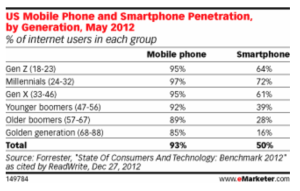Technology Can Enhance Communication with Grandchildren
I’m not sure when it happened, but sometime in the last decade Seniors became more comfortable with communication technology. When my dad retired in 1982 and moved to Canada, our only means of communication had been letters and phone calls. But today, when my friends and colleagues retire and move to Costa Rica, Kenya, or Sutter Creek, their families can expect regular conversations via Skype or Face Time or Google Hangout, as well as early morning or late night Instagram posts, tweets and texts. All of which is good, in my opinion.
In an earlier post I suggested that such technological enhancements to communication can help keep grandparents connected with their families who live far away. And they can. I had a long talk with a friend recently who had been discouraged and frustrated when her grandchildren in another state didn’t answer her carefully-crafted letters and cards, even though she sent them “communication kits” containing postcards, notepads, envelopes, and stamps. She had dragged her feet about upgrading to a smart phone and tablet and learning how to use them, but she agreed that the rewards were worth it.
If we are going to stay in touch with our families, adults or children, we have to keep up.
It’s Fun to Use Technology with Children
I like using technology even with my grandchild who lives just a few houses down the street. She doesn’t own her own phone yet, but her mom and I text each other several times a day over the mechanics of daily life. “I forgot to put an afternoon snack in Bean’s lunchbox; can you take one with you when you pick her up?” or “The traffic is worse than I expected. I’ll be a little late.” Bean can’t read or write too well yet, but lately she’s been sending her own messages: “Grandma, will you text Mama and ask her if I can stay for dinner?”
She knows all about Siri, the lady who lives inside my cell phone, and how to ask her questions, and she knows that we can look up lyrics to favorite songs or poems on the internet, as well as download coloring sheets and look up all sorts of interesting information. We usually sit together at my big computer for those activities, and figure out the key search words together. Sometimes we watch movies together on my iPad; when I can’t stand to see Happy Feet or Frozen one more time, I hand her my headphones and sit beside her with my laptop or a book; Bean likes to talk about the characters on the screen.
The Downside of Smart Phones
But smart phones come with a built-in downside: they’re addictive. Plenty has already been written about children’s overuse of cell phone technology — their incessant texting, sometimes even to friends in the same room; their antisocial behavior at family meals and on outings; their lack of interest in doing anything else, like playing outside or reading a book.
But recently the conversation has switched to parents. Is their own cell phone addiction perhaps modeling and fueling the behavior in their children?
In 2014, researchers at the Boston Medical Center published the results of a small study identifying “common themes of device use” during family mealtimes. Their objective was to describe naturalistic patterns of mobile device use by caregivers and children, and to generate hypotheses about its effects on caregiver-child interaction.
The blind study used trained observers to watch and take notes about families they saw in restaurants. The notes included information about how the parents interacted with their cell phones and with their children, and how children behaved in these environments.
The lead author, Dr. Jenny Radesky, a specialist in developmental behavioral pediatrics at Boston Medical Center, said, “Caregivers who were highly absorbed in their devices seemed to have more negative or less engaged interactions with children.” Examples included one mother kicking her child under the table for interrupting her while she was talking on the phone, and another described a mother pushing her son’s hands away when he was repeatedly trying to lift her face away from a tablet screen. Not a pretty picture, especially when you think about the benefits to children and their parents of face-to-face interaction at mealtimes.
Cell Phone Addiction Sneaks Up On You
So here’s my concern. The age group with the largest saturation of cell phone usage is the 25-34 year olds, many of whom are parents. Many parents use smartphones all day in their jobs, and then continue to use them when they come home to their families. We have all become accustomed to seeing members of this age group glued to their phones in public places: airports, restaurants, on buses and trains. Not surprising, then, that the researchers in Boston found them choosing their phones over their children at mealtime.
However, until recently I didn’t see many people my age (60 and older) using their cell phones in public. Then suddenly I did. In an airport I realized one day that there were four other women my age checking their messages, texting, or posting to Facebook while waiting for their flight. At a conference I saw three of my colleagues sitting together at a table staring at their screens instead of talking with one another. Finally, I was at the Children’s Discovery Museum with Bean and I saw a grey haired woman NOT engaging with her grandchildren, but texting. (I’d like to think she was sending a photo of her grandchildren enjoying the museum to their parents.)
According to several different surveys, Boomer smartphone use has been increasing rapidly since 2010, and it is expected to surpass 50% of cell phone users in the 47-67 age group by the end of 2015.
With smartphone use comes the risk of addiction, signaled by anxiety when separated from the cell phone, and a tendency to ignore other people when using it. It’s the screen that demands our attention, more than the phone. This dependency can sneak up on you. Now that so many of us are familiar with smart phones, using them often, enjoying the freedom that they provide us, it is really easy to get complacent and forget the human beings around us. It turns out Boomers are just as vulnerable as their children to being glued to their screens.
If that starts to happen, and I’ve caught myself sneaking a peek at my messages when Bean wasn’t looking, it’s time to pay attention and make some rules for ourselves. How about making your grandchildren a cell-free zone? Set the ringer to vibrate, and put the phone in your pocket, or at least turn it screen side down and put it somewhere out of reach. Limit your texts to those necessary for the care of your grandchildren. No screens at mealtimes. None in the car for at least fifteen minutes after pick up from home or school or camp — those minutes are too valuable an opportunity to talk and share with one another how our day has been going. None during playtime, or when you’re reading a story.
We all remember telephones hanging on walls, and on desks, and attached to answering machines, right? Let’s pretend, from time to time, that just like in the old days, we’ve turned off the ringer, and we’re letting the machine answer our phone. It won’t care. People matter much more than phones. Especially children.
Remember how much I love your comments — to add one, just click on the link below that ends in the word “comment.” Thanks!
You can also share this essay on social media:
Share this post




My son is taking care by his grandparent (my parent) due to work my commitment, my son always attached to my dad and always using his cell phone.i cant control my son to use cellphone or any kind of his behaviour. And also my son dont like to be with me and my wife cos we always control him using handphone. He is so obses with handphone. He would like to use handphone from the moment he open his eye in the morning until late at night.
Victor,
I’m so sorry you are having to deal with a phone addiction. It sounds like you need to have a serious talk with your dad – if you can’t get him to limit your son’s cell phone use I recommend that you find another child care solution. This can have long term implications, as you can already see.
You should read Sherry Turkle’s Reclaiming Conversation: The Power of Talk in a Digital Age. It might make you want to drop-kick these hideous devices into outer darkness. Their addictive effect on children, parents, and grandparents is catastrophic: decreased empathy, attention deficit, burning resentment and sense of rejection, apathy, anxiety, disturbed sleep, and depression. Turkle documents these effects exhaustively.
All of this exists so that tech companies can make money. And the environment suffers from the mountains of e-waste. We got along without these wretched things for millennia. Reclaim your lives.
Hilary,
I have, in fact, read Turkle’s book, and have recommended it to several people as well as joined a Lifelong Learning discussion group using it as a basis for conversation. I don’t disagree with her, or with you, that we’d be better off in many ways without these devices. However, as a proponent of eliminating television in the 1970s, limiting my son’s gun play and encouraging my daughter’s erector set and lego play, I was unable to stem the tide of those popular activities. I expect I would be just as ineffectual at trying to get my family to put away their tech tools, let alone the whole society. I have come to believe that the best approach is education, mediation, and moderation.
I think we all need a time when we are NOT to
use our cell phones, like maybe at the meal table.
also,i have found it useful for myself, to lump cell phone
or e-mail to a certain time.
if i feel the urge to use the cell phone or e-mail at a
relax time, i can write my self a note,
about a message or phone call to do later.
Dennie,
I think those are both good ideas, turning off the cell phones at the meal table and lumping smart phone use to a certain time of day, probably for anyone, but definitely for parents and grandparents when they are around children. Being “connected” all the time leads to stress and seems to also encourage connection addiction. Not to mention it leads to children thinking they are less important than whomever is on the other end of the connection.
Marlene